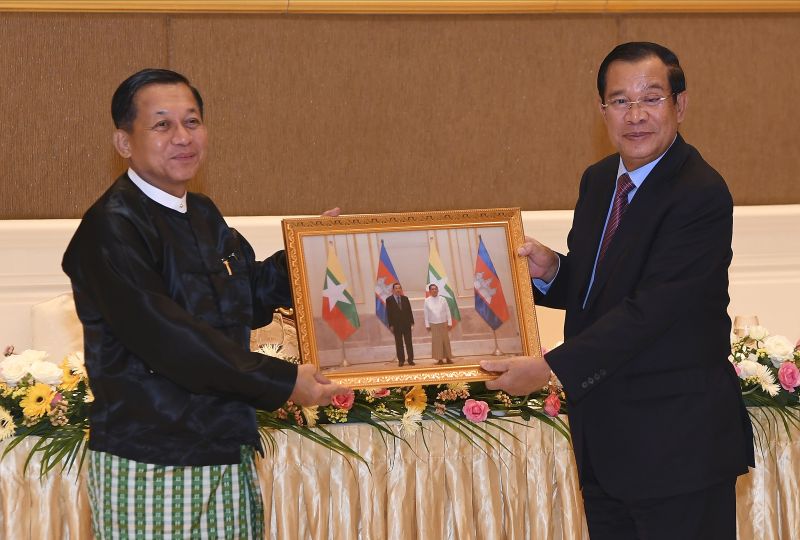
On Jan. 7, Cambodian Prime Minister Hun Sen arrived in Myanmar for a two-day visit, making him the first Southeast Asian leader to travel there since the February 2021 military coup that overthrew the elected government of Aung San Suu Kyi. The Myanmar opposition, which is engaged in a bitter struggle with the military regime, harshly criticized the Cambodian leader for legitimizing the ruling junta.
Hun Sen wasn’t acting out of altruism. He clearly expected the leaders of Myanmar to return the favor by supporting his own authoritarian regime. Unfortunately, such behavior is becoming the norm around the region. The elaborate network of mutual dependence among Southeast Asian autocrats is accelerating the steady decline of democracy.
The 2014 coup in Thailand established an ominous pattern. After the toppling of the elected government of Yingluck Shinawatra, Myanmar swiftly dispatched a representative to legitimize the Thai military’s unlawful intervention in politics. As the first Association of Southeast Asian Nations leader to visit Bangkok, Myanmar’s commander in chief, Gen. Min Aung Hlaing, praised the Thai military for “doing the right thing” in seizing power. Last year, finally, he followed the Thai example by staging his own coup.
Min Aung Hlaing’s relationship with Thailand is more than skin-deep. In 2012, Thai military chief Gen. Prem Tinsulanonda, a former prime minister, “adopted” the Myanmar general as his son — a good example of how personal ties among military elites in Southeast Asia serve to reinforce their authoritarian policies. When the Myanmar army launched its genocideagainst the Rohingya Muslims, the Thai generals said not a word.
The despots learn from each other. When Myanmar’s generals drew up a new constitution in 2008, they reserved 25 percent of parliamentary seats for delegates from the armed forces. The Thai junta’s members later rewrote their country’s own constitution along similar lines, granting themselves the right to fill the Senate with their own cronies. This mutual admiration society leads to surreal ironies. After last year’s coup, the leader of Myanmar’s junta asked Thailand for its help in supporting his country’s “democracy.”
Cambodia has been happy to join the team. Despite previous tensions between the two countries, Cambodia’s deputy prime minister and defense minister, Gen. Tea Banh, visited Thailand after the 2014 coup and praised the Thai military for bringing peace and order to Thailand. Tea Banh’s visit paved the way for an official trip to Thailand by Hun Sen in December 2015. Hun Sen met with the junta leader Gen. Prayuth Chan-ocha for talks on several issues — a move seen as Cambodia’s endorsement of the Thai coup.
In April 2019, the two leaders met again in the Thai border town of Aranyaprathet to mark the ceremonial reopening of a rail link that would restore train service between the two countries after more than four decades. Earlier, Thailand had expressed concern about covert support provided by the Cambodian government to the pro-democracy, red-shirted activists who escaped to Cambodia. In the wake of the coup, they had used Cambodia as a base for activities against the junta in Bangkok.
While much of the discussion between the two leaders focused on normal bilateral cooperation, Prayuth also asked Hun Sen to crack down on the exiled dissidents. The consequences of those discussions soon became clear. On June 4, 2020, unknown assailants abducted Thai dissident Wanchalearm Satsaksit in broad daylight in Phnom Penh; he was never seen again. Cambodia was no longer a safe haven.
China’s rise is also contributing to the general decline of democracy in the region. Beijing not only provides Southeast Asian autocrats with a tempting model of tightly controlled authoritarian state capitalism but also exports surveillance equipment, weaponry, and disinformation techniques. In 2019, the Thai government signed a deal to buy software from Megvii, a Chinese company that makes hi-tech surveillance systems. The Myanmar military has been setting up elaborate facial recognition networks with the assistance of Chinese telecoms giant Huawei.
The Belt and Road Initiative reinforces Beijing’s efforts to project its sovereignty, rules or undue influence over smaller states. At the same time, it also creates networks of mutual dependence between Beijing and regional autocracies that would only facilitate an unfavorable environment for democracy.
In the case of Thailand, China has become not just a critical economic partner but also a potential model of governance. Ties between Beijing and Bangkok today are arguably stronger than those between Thailand and the United States.
The collaboration among these states is hardly unique to Southeast Asia. Authoritarian trends are making themselves felt around the world. Democratic decline is no longer concentrated in one region or continent. The coup in Sudan, the Taliban takeover in Afghanistan and the crackdown in Belarus are all part of the authoritarian resurgence.
As authoritarian states such as China wield their power with increasing aggressiveness and as established democracies in the West and the developing world show little resolve to stand up for their values, the international environment for democracy is deteriorating. Southeast Asia offers a vivid example of how bad things can get.
Pavin Chachavalpongpun is associate professor at Kyoto University’s Center for Southeast Asian Studies.
